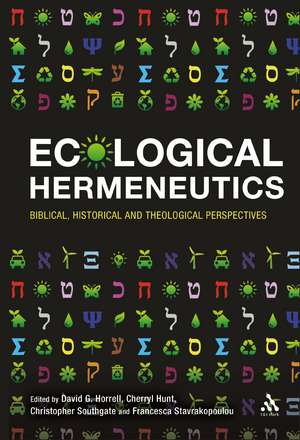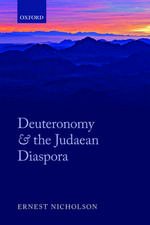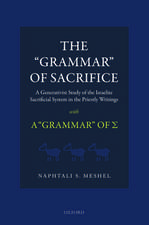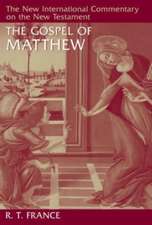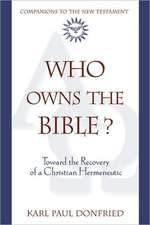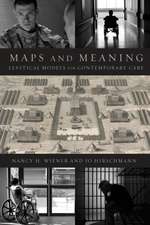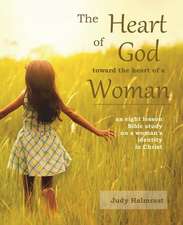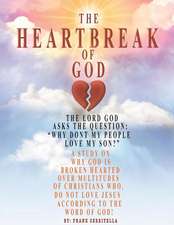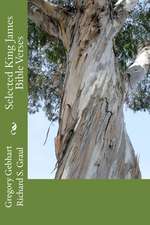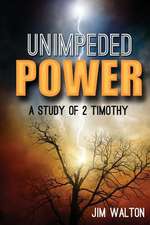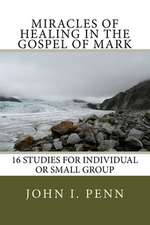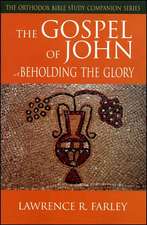Ecological Hermeneutics: Biblical, Historical and Theological Perspectives
Editat de Prof. David G. Horrell, Cherryl Hunt, Dr. Christopher Southgate, Francesca Stavrakopoulouen Limba Engleză Paperback – iun 2010
| Toate formatele și edițiile | Preț | Express |
|---|---|---|
| Paperback (1) | 301.48 lei 6-8 săpt. | |
| Bloomsbury Publishing – iun 2010 | 301.48 lei 6-8 săpt. | |
| Hardback (1) | 951.20 lei 3-5 săpt. | |
| Bloomsbury Publishing – iun 2010 | 951.20 lei 3-5 săpt. |
Preț: 301.48 lei
Preț vechi: 327.17 lei
-8% Nou
Puncte Express: 452
Preț estimativ în valută:
57.69€ • 61.69$ • 48.10£
57.69€ • 61.69$ • 48.10£
Carte tipărită la comandă
Livrare economică 17 aprilie-01 mai
Preluare comenzi: 021 569.72.76
Specificații
ISBN-13: 9780567033048
ISBN-10: 056703304X
Pagini: 352
Dimensiuni: 156 x 234 x 20 mm
Greutate: 0.52 kg
Editura: Bloomsbury Publishing
Colecția T&T Clark
Locul publicării:London, United Kingdom
ISBN-10: 056703304X
Pagini: 352
Dimensiuni: 156 x 234 x 20 mm
Greutate: 0.52 kg
Editura: Bloomsbury Publishing
Colecția T&T Clark
Locul publicării:London, United Kingdom
Caracteristici
Will reflect the most up-to-date research on the relationship between the Bible and environmental ethics, an increasingly important and widely studied issue.
Cuprins
Introduction (The Editors)Section 1: Biblical perspectivesSection Introduction (The Editors)1.The Creation Stories: their Ecological Potential (and Problems) (John Rogerson)2.Land, Sin, Sacrifice: The ecological ethics of Leviticus (Jonathan Morgan)3.Reading the Prophets from an Environmental Perspective (John Barton)4.The Significance of the Wisdom Tradition in the Ecological Debate (Katharine Dell)5.Jesus and the Gospels in Ecotheological Perspective (Richard Bauckham)6.An Ecological Reading of Rom 8.19-22: Possibilities and Hesitations (Brendan Byrne)7.Hellenistic Cosmology and the Letter to the Colossians: Towards an Ecological Hermeneutic (Vicky Balabanski)8.Cosmic Catastrophe Imagery in the New Testament (Edward Adams)Section 2: Insights from the history of interpretationSection Introduction (The Editors)9.In the Beginning: Irenaeus, Creation, and the Environment (Francis Watson)10.The Fathers' Readings of Genesis 1 (Morwenna Ludlow)11.Thomas Aquinas: Reading the Idea of Dominion in the Light of the Doctrine of Creation (Mark Wynn)12.Reformation readings of the Creation stories (H. Paul Santmire)13.Between Creation and Transfiguration: the environment in the Eastern Orthodox Tradition (Andrew Louth)14.Karl Barth's Approach to Scripture and its Ecological Potential (Geoff Thompson)15.Hans Urs von Balthasar and a Creation-centred Hermeneutic (David Moss)16.Jürgen Moltmann on God and Creation (Jeremy Law)Section 3: Contemporary hermeneutical possibilitiesSection Introduction (The Editors)17.The Greening of American Fundamentalism and Its Detractors (Harry Maier)18.New Testament Eschatology and the Ecological Crisis in Theological and Ecclesial Perspective (Stephen Barton)19.Sustainable Countryside (Tim Gorringe)20.Towards a Theological Ecological Hermeneutic (Ernst Conradie)Epilogue (The Editors)IndexesIndex of Biblical TextsIndex of Modern AuthorsIndex of Subjects
Recenzii
'This wonderful volume demonstrates the rich exegesis of Scripture and the Christian theological tradition, drawing upon a wide range of texts from varied yet complementary angles. Further, it offers perhaps the best small collection of resources I know for reworking and developing a Christian theology of the created order for our own critical time. This book of intelligent and highly engaging essays should be widely known and used in multiple teaching settings within the academy and the church.' - Ellen F. Davis, A. R. Kearns Professor of Bible and Practical Theology, Duke Divinity School, Durham, NC, USA.
'This is an excellent book and one that is much needed. There is no issue more urgent for contemporary theology, as it comes to terms with the demands of the ecological crisis, than carefully thinking through its approach to the interpretation of biblical texts. /Ecological Hermeneutics/ makes an indispensable contribution. The contributors bring a great deal of learning and some wonderful insights from their specialist disciplines, and communicate a strong sense of commitment to both the good of the Earth community and the integrity of biblical faith.' - Denis Edwards, Catholic Theological College, Australia
'At present, issues in ecological ethics confront us urgently at both global and personal levels. Over recent decades they have raised myriads of questions for theology and more recently for biblical interpretation. Ecological Hermeneutics, a collection of essays emerging from an AHRC funded project at the University of Exeter, makes an important new contribution to the search for adequate ways to interpret biblical texts and theological traditions ecologically. The volume is framed by the essays of Horrell and Conradie each of whom engage very explicitly the search for a viable ecological hermeneutic and both indicating a preference for a doctrinally-based perspective. The essays within that frame demonstrate the rich variety of approaches and engagement with text and tradition that constitute emerging ecological hermeneutics. For those coming new to this area of scholarship, the collection of essays will provide a challenging introduction and for those who are more deeply engaged with the topic, it will broaden their participation in this important field of inquiry.' - Elaine Wainwright, The University of Auckland, New Zealand.
'Ecological Hermeneutics is a well crafted set of essays that derive from a three year project at the University of Exeter... The editorial quality is high, and the four editors have clearly worked well as a team. The volume displays an evenness in style across the 20 contributions that clearly didn't happen by accident.'
Ecological Hermeneutics is an important book on an important subject... a unique and useful contribution to the growing literature on ecology and the Bible... By bringing together highly competent essays in the fields of biblical exegesis, the history of interpretation, and theology, the editors offer us an invaluable set of resources for the ongoing task of reshaping Christian thought in light of the environmental crisis.
This multi-disciplinary collection is ambitious but successful, and will prove stimulating reading for readers with some experience in academic theology and exegesis, who are interested in bringing the bible to bear on ecological issues.
Twenty leading scholars reflect critically on the kinds of appeals to the Bible that have been made in environmental ethics and ecotheology; engage biblical texts with a view towards exploring their contribution to an ecological ethics; and explore the kind of hermeneutic necessary for such engagement to be fruitful for contemporary theology and ethics.
This valuable collection of essays arose from seminars convened by Exeter's project on Uses of the Bible in Environmental Ethics ... The book's introduction by David Horrell sets out strategies for ecological hermeneutics that are 'coherent (and in dialogue) with a scripturally shaped Christian orthodoxy' through learning critically from the history of interpretation while acknowledging that 'ethical appropriation is necessarily a constructive endeavour' (pp. 8-9). This multidisciplinary collection of essays is a substantial contribution to that endeavour and will be helpful to those interested in theological approaches to environmental ethics.
'This is an excellent book and one that is much needed. There is no issue more urgent for contemporary theology, as it comes to terms with the demands of the ecological crisis, than carefully thinking through its approach to the interpretation of biblical texts. /Ecological Hermeneutics/ makes an indispensable contribution. The contributors bring a great deal of learning and some wonderful insights from their specialist disciplines, and communicate a strong sense of commitment to both the good of the Earth community and the integrity of biblical faith.' - Denis Edwards, Catholic Theological College, Australia
'At present, issues in ecological ethics confront us urgently at both global and personal levels. Over recent decades they have raised myriads of questions for theology and more recently for biblical interpretation. Ecological Hermeneutics, a collection of essays emerging from an AHRC funded project at the University of Exeter, makes an important new contribution to the search for adequate ways to interpret biblical texts and theological traditions ecologically. The volume is framed by the essays of Horrell and Conradie each of whom engage very explicitly the search for a viable ecological hermeneutic and both indicating a preference for a doctrinally-based perspective. The essays within that frame demonstrate the rich variety of approaches and engagement with text and tradition that constitute emerging ecological hermeneutics. For those coming new to this area of scholarship, the collection of essays will provide a challenging introduction and for those who are more deeply engaged with the topic, it will broaden their participation in this important field of inquiry.' - Elaine Wainwright, The University of Auckland, New Zealand.
'Ecological Hermeneutics is a well crafted set of essays that derive from a three year project at the University of Exeter... The editorial quality is high, and the four editors have clearly worked well as a team. The volume displays an evenness in style across the 20 contributions that clearly didn't happen by accident.'
Ecological Hermeneutics is an important book on an important subject... a unique and useful contribution to the growing literature on ecology and the Bible... By bringing together highly competent essays in the fields of biblical exegesis, the history of interpretation, and theology, the editors offer us an invaluable set of resources for the ongoing task of reshaping Christian thought in light of the environmental crisis.
This multi-disciplinary collection is ambitious but successful, and will prove stimulating reading for readers with some experience in academic theology and exegesis, who are interested in bringing the bible to bear on ecological issues.
Twenty leading scholars reflect critically on the kinds of appeals to the Bible that have been made in environmental ethics and ecotheology; engage biblical texts with a view towards exploring their contribution to an ecological ethics; and explore the kind of hermeneutic necessary for such engagement to be fruitful for contemporary theology and ethics.
This valuable collection of essays arose from seminars convened by Exeter's project on Uses of the Bible in Environmental Ethics ... The book's introduction by David Horrell sets out strategies for ecological hermeneutics that are 'coherent (and in dialogue) with a scripturally shaped Christian orthodoxy' through learning critically from the history of interpretation while acknowledging that 'ethical appropriation is necessarily a constructive endeavour' (pp. 8-9). This multidisciplinary collection of essays is a substantial contribution to that endeavour and will be helpful to those interested in theological approaches to environmental ethics.
